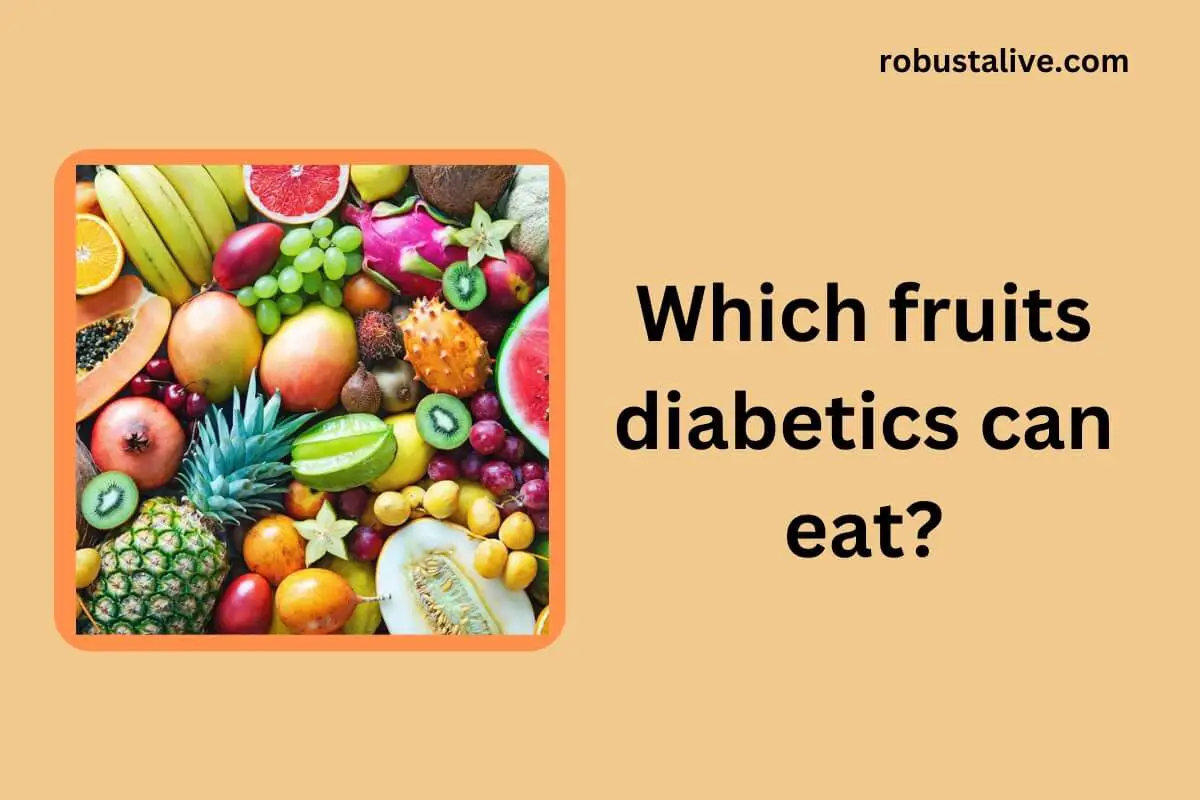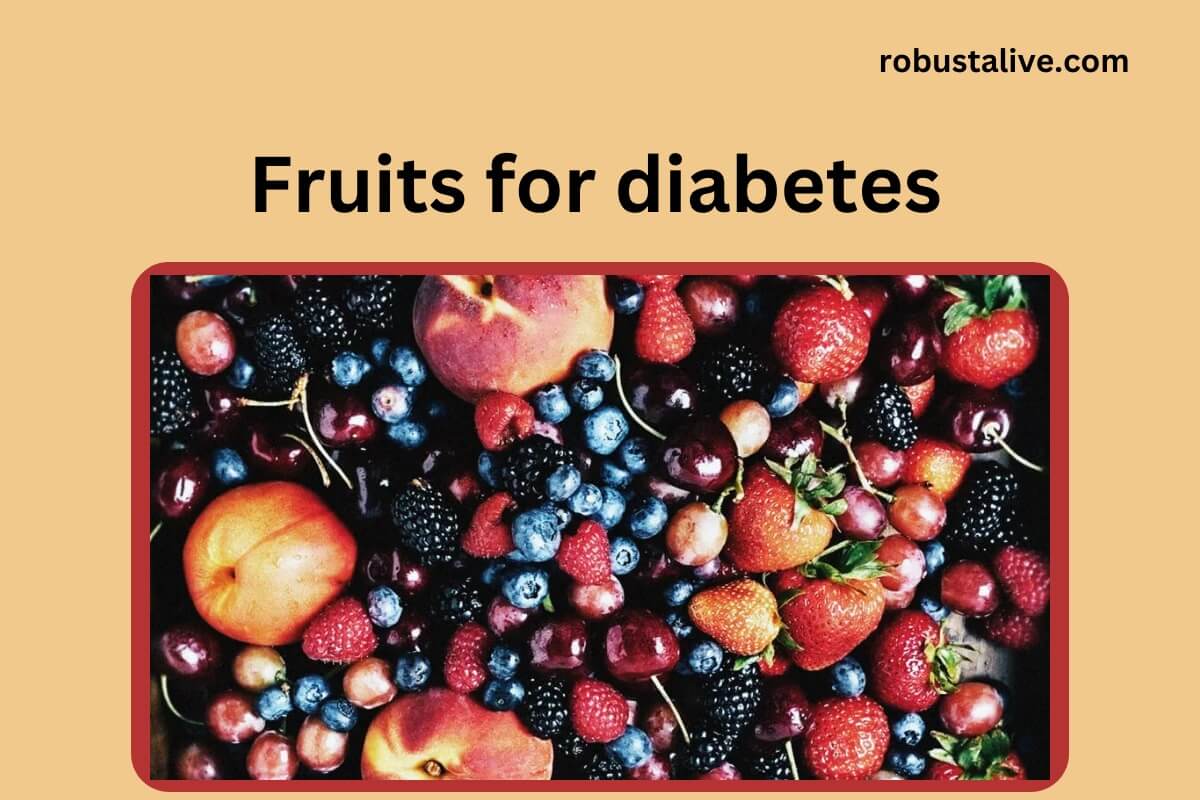Which Fruits Diabetics can Eat?

Which Fruits Diabetics can Eat? Type 2 diabetic patients know the importance of paying attention to their carbohydrate intake. Eating carbs turns directly into sugar and impact the blood glucose level.
Fruits are generally rich in simple carbohydrates like glucose and fructose. These simple sugars directly convert into energy that can affect the blood sugar level. So diabetes patients have to look at the glycemic index of the fruits carefully.
Do fruits affect the diabetes eating plan? And, which fruits diabetics can eat? These are the most frequently asked questions. According to the ADA (American Diabetes Association), fruits are an excellent way to satisfy your sweet cravings. But they also advise you to count it in your meal plan as a carb source.
What is the correct portion size?
According to the experts, the serving size of the fruits should depend upon the carb content of the fruits. One serving of fruit has around 15 grams of carbs. The fruit serving with 15g of carbs includes:
- 1 small piece of fresh fruits
- ½ cup of frozen fruits and canned fruits
- 2 teaspoons of dry fruits, cherries, or raisins.
Other servings with the 15g of carbs include:
- 1 small banana
- ½ medium apple
- 1cup cubed honeydew melon
- 1 cup of blackberries
- 1 cup of raspberries
- ¾ cup of blueberries
- ¼ cup of strawberries
- 17 small grapes
Best 8 fruits for diabetics can eat

Graphics Credit: Robustalive.com
Here are the top 8 fruits diabetics can eat, and they will not impact blood glucose levels.
1. Berries
Berries are not only a refreshing treat for a diabetic person, but they also have beneficial antioxidants against diseases. According to the experts, all berries, like blueberries or strawberries, are healthy for diabetics but control the portion size. The ADA refers the berries as a superfood because they are rich in fiber and antioxidants.
According to the US Department of Agriculture, one cup of fresh blueberries has around 21g of carbohydrates and 84 calories. If you have control over popping them into your mouth, try the alternating fruit layers in plain nonfat yogurt. It can be an excellent diabetic breakfast.
2. Tart cherries
According to the USDA, one tart cherry cup has 52 calories and 12.6g of carbs. These fruits are also very beneficial against inflammation. Due to the presence of antioxidants, these fruits help fight against cancer, heart disease, and many other diseases. You can purchase tart cherries in the canned, fresh, dried, or frozen form.
The manufacturers add additives and artificial sweeteners in most canned fruits, so check the labels. Be careful of the portion size, as you can’t eat them till you feel full. Dried fruits aren’t that filling but richer in nutrients, so go for small portions.
3. Peaches
Peaches are the best warm-weather treat that you can include in a diabetes-friendly diet. According to the USDA, one medium peach has 59 calories and 14g of carbohydrates. It also has 10mg of Vitamin C, which makes it a good source of nutrients like potassium, with about 285mg in it.
Vitamin C plays many vital roles in the body like helping the body in the formation of blood vessels and cartilage that aids in the healing process. According to the research, potassium benefits the body by normalizing the cells’ fluid levels.
Peaches have a unique and delicious flavor that you like adding to unsweetened ice teas. When you want a delightful but diabetes-friendly snack, add peach slices to the quick smoothies with low-fat buttermilk and crushed ice.
4. Apricots
Apricot is a delicious summer treat that can be a perfect addition to the diabetes meal plan. According to the USDA, four small apricots have around 17 calories and 4g of carbohydrates. These tiny fresh fruits fulfill the 134 micrograms of the daily vitamin A requirement.
According to the National Institute of Health, vitamin A benefits the immune system and vision and has many other bodily roles. This delicious fruit is also rich in fiber with around 3g per the same group of 4. Mix the dry fresh apricots into the cold and hot cereal or add a salad.
5. Oranges
A medium size orange is enough to fulfill your daily vitamin C requirement. This feature makes it an excellent source of vitamin C. According to the USDA, delicate oranges come with 16g of carbohydrates and 65 calories.
There is about 24mcg of folate in a medium orange that helps in the red blood cell formation and 238mg of potassium that normalizes the blood sugar levels. This juicy treat and other citrus fruits, like grapefruits, are excellent for diabetic people.
6. Apples
You must have heard the quote an apple a day keeps the doctor away. While going out, toss an apple in your purse or bag. A medium size apple has 95 calories and 25g of carbs. If you are trying the serving size of 15g carbs, eat a medium size apple.
Apples are rich in fiber and vitamin C, providing 8.37mg. Apple skin is nutritious so eat it without peeling. According to the Harvard school of public science, the nutrients in the apple skin have many heart-protective antioxidants that benefit health.
7. Pears
Pears are rich in fiber and are an excellent source of fiber. According to the USDA, a medium pear has around 5.5g. Thus it can be a great addition to the diabetes meal plan. Besides, unlike other fruits, their flavor and texture improve after you have picked them, and you can easily store them in the refrigerator.
You can add pears slices to the spinach salad to enhance its taste.
8. Kiwi
Kiwi is a fuzzy brown peel that hides a bright green delicious fruit inside. According to the USDA, the delicious kiwi is rich in potassium, vitamin C, and fiber. One kiwi has around 11g of carbohydrates and 48 calories. The nutrient value makes kiwi an ideal diabetes-friendly fruit.
You can find kiwi all year and easily store them in a refrigerator for a week.
Are fruit juices diabetes-friendly?
One-half cup of fruit juice has approximately 15 grams of carbs. Besides, there are no clear thoughts about fruit juices and diabetes in the research:
- A 2013 research observes thousands of people over several years. They concluded that the greater consumption of fruit juices is directly related to the high risk of type 2 diabetes.
- A 2017 research of controlled trials states that pure fruit juice consumption doesn’t increase the type 2 diabetes risk. It also declares that detailed analysis is still essential to understand the effect of pure fruit juice on blood sugar level maintenance.
The ADA suggests drinking fresh fruit juices in small portions means 4 ounces daily. If you purchase it from a store, check if it’s 100% pure with no additives. Experts recommend eating whole fruit instead of fruit juices.
The fiber in whole fruits makes you feel full and delays digestion. The delay will benefit in avoiding the sudden spike in the blood sugar level after having the fruits.
Conclusion
Fruits are healthy and should be a part of the diabetic’s diet. But you must pay attention to portion control. 15g of fruit in a serving is a healthy option. Make sure you count the fruits as a carb while counting the daily calorie intake.
Healthy nutrients are an essential diabetes care tool. If you have type 2 diabetes, a healthy diet plan and diabetes medication can benefit in controlling the blood sugar level.
Frequently Asked Questions (FAQs) about Which Fruits Diabetics Can Eat?
Which fruits should diabetics avoid?
Diabetics should avoid fruits with a high glycemic index or eat in moderation to prevent the sudden spike in blood sugar levels. Watermelon, pineapple, lychee, banana, and mango have a very high glycemic index. So these fruits should be avoided by diabetic patients.
What fruits diabetics can eat?
According to the American Diabetics Association reports, any fruit is fine for a diabetic patient as long as he is not allergic and eating it is limited. Besides, a 2017 study shows that high food intake is linked with standard type 2 diabetes risks.
Are grapes healthy for diabetics?
Grapes are nourishing fruits that are ok for diabetic patients. You can add them to your diet as they don’t result in a sudden spike in your blood sugar level. Consuming grapes benefits in reducing type 2 diabetes vulnerability.
Can a diabetic eat an apple?
Apples are an excellent source of fruits and are a healthy option for a diabetic diet. The dietary guidelines for diabetic people recommend adding a lot of healthy low in carb vegetables and fruits. Low-in-carb vegetables and fruits are generally rich in minerals, fiber, antioxidants, and vitamins.
References
- https://www.webmd.com/diabetes/fruit-diabetes
- https://www.medicalnewstoday.com/articles/311220
- https://www.livescience.com/which-fruits-are-good-for-diabetics
- https://www.healthline.com/health/fruits-for-diabetes
- https://www.womenshealthmag.com/food/g38957494/best-fruits-for-diabetics/
- https://www.goodhousekeeping.com/health/diet-nutrition/g35205635/best-fruits-for-diabetes/





